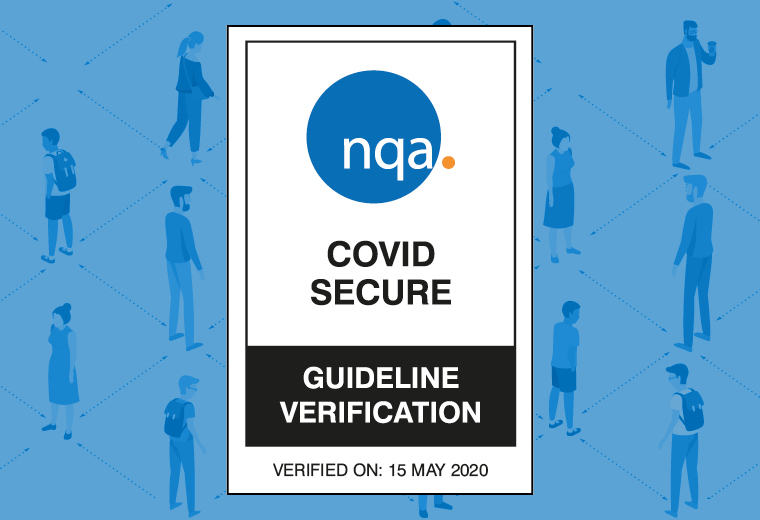The Latest HS&E Coronavirus Legislation
Here you will find the most relevant coronavirus legislation updates for H&S and Env from our partner The Compliance People. This isn’t an exhaustive list as there has been over 600 amendments made in the last few weeks which can mostly be captured on the .gov.uk site here https://www.legislation.gov.uk/coronavirus.
England, Scotland, Wales, Northern Ireland: Coronavirus Act 2020 Regulation 51 Powers Relating to potentially infectious persons
This Act sets out much of the UK Government’s emergency response to the 2020 coronavirus pandemic. The Act makes multiple temporary changes to administrative and regulatory requirements relating to healthcare, schools, social care, food supply, courts and tribunals, local authorities, local elections, ports, pensions and other benefits, etc. The Act does not create duties relevant to management of health, safety and environmental matters.
The Act gives the Secretary of State and the devolved administrations, power to declare that the spread of coronavirus presents a serious and imminent threat, which in turn triggers powers of health officials, police constables and immigration officers to detain potentially infectious people, and power to request information to be provided about an infectious person’s recent contacts. These powers may be of interest to organisations.
It revokes the Health Protection (Coronavirus) Regulations 2020 and the Health Protection (Coronavirus) (Wales) Regulations 2020.
Environment
England, Scotland, Wales: The Feed-in Tariffs (Amendment) (Coronavirus) Order 2020
These Regulations extend the period for small-scale renewable electricity generators who had pre-registered of pre-accredited to the Feed in Tariff Scheme, to apply for accreditation.
England: The Single Use Carrier Bags Charges (England) (Amendment) Order 2020
A temporary exemption from the need to charge for single use carrier bags, used for home delivery, are removed from 21st March 2020 and 21st September 2020
Scotland: The Single Use Carrier Bags Charge (Scotland) Amendment Regulations 2020
Temporary duties apply to retailers and takeaway food establishments supplying single use carrier bags. Monetary charges for any single use carrier bags with the sole purpose of carrying goods for home delivery as part of a grocery service, goods purchased for collection of groceries, or goods for delivery from a takeaway service are removed for a six-month period, due to Coronavirus.
Wales: The Single Use Carrier Bags Charge (Wales) (Amendment) Regulations 2020
A temporary exemption from the need to charge 5 pence for single use carrier bags used for the delivery or collection of groceries is added.
Northern Ireland: The Single Use Carrier Bags Charge (Coronavirus Amendment) Regulations (Northern Ireland) 2020
Temporary duties apply to retailers supplying single use carrier bags. Monetary charges for any single use carrier bags with the sole purpose of carrying goods supplied by a seller for home delivery, as part of a grocery service, are removed for a six-month period, due to Coronavirus.
England: The Town and Country Planning (General Permitted Development) (Coronavirus) (England) (Amendment) Order 2020
A new permitted development right is added to allow local authorities and certain health service bodies in England to carry out certain developments in an emergency for which planning permission is not required.
England: The Town and Country Planning (General Permitted Development) (England) (Amendment) Order 2020
These Regulations allow cafes and pubs to add a takeaway or delivery service without changing usage.
Scotland: The Town and Country Planning (Miscellaneous Temporary Modifications) (Coronavirus) (Scotland) Regulations 2020
Temporary modifications are made to remove the requirement for a public event to be held as part of a pre-application consultation during the Coronavirus (COVID-19) emergency period. And temporary modifications are made to remove the requirement to make copies of the environmental impact assessment available for inspection during the Coronavirus (COVID-19) emergency period.
Wales: The Town and Country Planning (General Permitted Development) (Amendment) (Wales) Order 2020
A new permitted development right is added to allow local authorities in Wales to carry out certain development in an emergency for which planning permission is not required.
Wales: The Town and Country Planning (General Permitted Development) (Amendment) (No. 2) (Wales) Order 2020
These Regulations allow NHS bodies in Wales to build temporary structures or change the use of existing buildings for the purposes of responding to a public health emergency (i.e. the coronavirus pandemic). These temporary developments do not require an application for planning permission.
Republic of Ireland: Building Control Act 1990 (Section 5) Order 2020
In order to relieve regulatory restrictions that could hinder the response to the Coronavirus (COVID-19) pandemic, changes are made to the requirements regarding construction and alteration of buildings used in response to the situation.
Republic of Ireland: Building Control Regulations 2020
In order to relieve regulatory restrictions that could hinder the response to the Coronavirus (COVID-19) pandemic, changes are made to the requirements regarding construction and alteration of buildings used in response to the situation.
Republic of Ireland: Emergency Measures in the Public Interest (COVID-19) Act 2020
Statutory deadlines in some planning and building development-related Acts are disregarded to ensure that the deadlines are not breached as a result of the Coronavirus (COVID-19) response.
Republic of Ireland: Planning and Development Act 2000 (Section 181) Regulations 2020
Certain classes of development are exempt from the requirements of the Planning and Development Act 2000 where they are carried out by or on behalf of a State authority in response to the Coronavirus (COVID-19) pandemic.
Republic of Ireland: Planning and Development Act 2000 (Exempted Development) (No. 2) Regulations 2020 (Republic of Ireland)
Restaurants and cafes, etc. that did not previously have a takeaway service can now offer one without having to obtain planning permission for a change of use of the premises. This is for a limited time in response to the Coronavirus pandemic
Scotland: The Electricity Works (Miscellaneous Temporary Modifications) (Coronavirus) (Scotland) Regulations 2020
The Electricity Works (Miscellaneous Temporary Modifications) (Coronavirus) (Scotland) Regulations 2020 remove requirements for certain planning documents to be made available for members of the public to view and replace this with a requirement to make them available for review in electronic format only.
Health and Safety
EU: Regulation (EU) 2020/466 on temporary measures to contain risks to human, animal and plant health and animal welfare during certain serious disruptions of Member States’ control systems due to coronavirus disease (COVID-19)
This EU Regulation introduces temporary measures to help EU Member States comply with regulations for plant and animal health during the Coronavirus (COVID-19) pandemic.
England, Wales, Scotland: The Working Time (Coronavirus) (Amendment) Regulations 2020
Annual leave missed due to effects of coronavirus can now be carried forward up to two years. If leave is carried forward as a result of coronavirus, and the worker’s employment is then terminated, the employer must pay the worker in lieu of the missed leave
England: The Health Protection (Notification) (Amendment) Regulations 2020
This amendment does not create any duties for business. These Regulations identify “COVID-19” as a notifiable disease and “SARS-CoV 2” as a causative agent and create notification requirements for doctors and diagnostic laboratories. No notification requirements are created under RIDDOR.
Republic of Ireland: Infectious Diseases (Amendment) Regulations 2020
The Infectious Diseases Regulations 1981 are amended to add Covid-19 as a notifiable disease. The Schedule is updated.
Scotland: The Public Health etc. (Scotland) Act 2008 (Notifiable Diseases and Notifiable Organisms) Amendment Regulations 2020
“COVID-19” is identified as a notifiable disease and “SARS-CoV 2” as a causative agent creating notification requirements for both. No notification requirements are created under RIDDOR.
Northern Ireland: The Public Health Notifiable Diseases Order (Northern Ireland) 2020
This Order does not create duties for businesses other than doctors and diagnostic laboratories. “COVID-19” is identified as a notifiable disease and “SARS-CoV 2” as a causative agent creating notification requirements for both. No notification requirements are created under RIDDOR.
Wales: The Health Protection (Notification) (Wales) (Amendment) Regulations 2020
This amendment does not create any duties for business. These Regulations identify “COVID-19” as a notifiable disease and “SARS-CoV 2” as a causative agent and create notification requirements for doctors and diagnostic laboratories. No notification requirements are created under RIDDOR.
England: The Health Protection (Coronavirus, Restrictions) (England) Regulations 2020
These regulations list the businesses and organisations which are required to close to prevent the spread of Coronavirus, and those which are not required to close. The Regulations also define the restrictions which apply to individuals.
Scotland: The Health Protection (Coronavirus) (Restrictions) (Scotland) Regulations 2020
These Regulations 2020 list the businesses and organisations required to close to prevent the spread of Coronavirus. They also list the businesses which are not required to close, but are required to implement social distancing. The Regulations also define the restrictions which apply to individuals.
Wales: The Health Protection (Coronavirus Restrictions) (Wales) Regulations 2020
These Regulations list various types of businesses and organisations which are required to close to prevent the spread of Coronavirus. They also list businesses which are not required to close but which must implement social distancing requirements. The regulations require local authorities to close certain public footpaths and access land. The regulations also define the restrictions which apply to individuals.
Northern Ireland: The Health Protection (Coronavirus, Restrictions) Regulations (Northern Ireland) 2020
These regulations list the businesses and organisations which are required to close to prevent the spread of Coronavirus, and those which are not required to close. The Regulations also define the
Republic of Ireland: European Union (Control of Exports of Personal Protective Equipment) Regulations 2020
These regulations implement European temporary emergency regulations which prevent export of certain types of PPE outside of Europe unless authorised by the Minister for Business, Enterprise and Innovation.
Republic of Ireland: Health (Preservation and Protection and other Emergency Measures in the Public Interest) Act 2020 (Republic of Ireland)
The Act amends the Health Act 1947 to give the Minister power to make regulations for the protection of public health from the spread of coronavirus, and gives medical officer power to detain somebody suspected of being infected where that person cannot or will not self-isolate themselves in their own home.
Republic of Ireland: Safety, Health and Welfare at Work (Construction) (Amendment) Regulations 2020
Extensions to the expiry dates of safety awareness registration cards from the SOLAS Safe Pass training programme are introduced to ensure that people can remain qualified during the Coronavirus (COVIS-19) pandemic. Cards that expired after the 1st of March 2020 are considered to still be valid.



